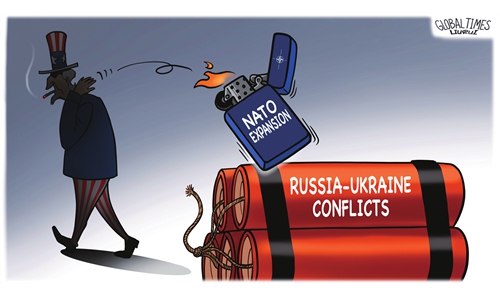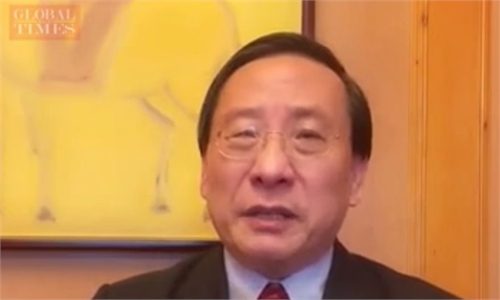
Photo: IC
In recent days, leaders from the US and Europe have frequently visited Ukraine to mark the 10th anniversary of the Euromaidan protests in Ukraine. Apart from expressing support for Ukraine's continued fighting, some Western officials have attempted to get China involved, describing the Ukraine crisis as an ideological struggle between the East and West. US Secretary of Defense Lloyd Austin even claimed that if Russia succeeds in Ukraine, "another autocrat" China will be emboldened to use military force to expand its territory in the Indo-Pacific.Undoubtedly, some in the West want to portray a geopolitical crisis as an ideological struggle between the East and West. They leverage the 10th anniversary of the Euromaidan protests to embellish their own role in this geopolitical game and wave the banner of "confronting autocracy" under the guise of ideology.
Hyping "ideological struggle" is a way to shift the focus of the Ukraine crisis. It is well known that this issue is a geopolitical security crisis between Russia and the Western bloc, where the NATO has significantly encroached on Russia's traditional geopolitical space. In particular, the Ukraine crisis from 2014 to 2022 is a result of the intensified geopolitical security tensions between Russia and NATO.
Currently, the Russia-Ukraine conflict has been ongoing for more than 600 days, and both the US-led NATO and Russia are stuck in a stalemate. It is challenging for one side to defeat the other militarily, economically and diplomatically. The people of Ukraine are suffering the consequences of war.
The West is undoubtedly attempting to shift the focus by glamorizing this blatant geopolitical struggle between major powers, by making it to be more about a competition of "the West against autocratic states." The goal is to use the rhetoric of "democracy and freedom" to conceal the zero-sum game and group politics that the West is playing in Ukraine.
After the end of the Cold War, most post-Soviet countries in the region chose Western democratic systems, and regular elections and free-market economies broke down the East-West differences of the Cold War era. Ten years ago, Ukraine had to choose between an Association Agreement with the European Union and the Eurasian Economic Union promoted by Russia. The direction of regional economic integration determined who would gain dominance in Ukraine. From the perspective of values, it does not involve an ideological struggle between Western democracy and non-Western ideologies.
Hyping the "democracy versus autocracy" struggle aims to coerce Western allies into footing the bill for US strategy. There is no sign in sight of a resolution to the Russia-Ukraine conflict that has become protracted, attritional and tug-of-war.
Since the beginning of 2023, the US has been stretched thin in providing military aid to Ukraine, with bipartisan disputes in the US House of Representatives delaying the approval of aid packages. The Biden administration is now facing significant domestic pressure.
To ease the storm of suspending appropriations for Ukraine, it continuously peddles the "Russia threat narrative" to European countries, depicting the Russia-Ukraine conflict as an ideological struggle between "democracy and autocracy" while trying to evoke Europe's memories of the Cold War era. Through security threats and ideological competition, the White House intends to make European countries pay for US global interests.
Today, as the Russia-Ukraine conflict drags on and the Israel-Palestine conflict has been reignited, the US is increasingly struggling to uphold its global hegemony but is unwilling to share its dominance and discourse power. Therefore, we see the Biden administration constantly playing the cards of "values" and "alliance" in his diplomacy, which, in essence, is an attempt to entice and coerce Western allies into serving US global strategy.
Hyping differences in ideologies does not help find a peaceful resolution of the Ukraine crisis. The ongoing Russia-Ukraine conflict has led to a continuous increase in casualties and displacements in Ukraine, and the situation remains worrisome. This is a serious geopolitical crisis facing Europe, causing significant losses to the global order and economy.
The international community has a responsibility and obligation to work together to promote the political and diplomatic resolution of this crisis. All efforts dedicated to the peaceful resolution of the Ukraine crisis should be collectively supported, and the escalation of conflict should be avoided.
Some in the West who hype the Ukraine crisis as an "ideological struggle" are, in reality, undermining the atmosphere for the international community to solve the Ukraine crisis. They intend to continue dividing the world, creating more contradictions and conflicts.
Looking back at the ten years since the Euromaidan protests in Ukraine, what the international community truly needs is dialogue and inclusiveness, not pointing fingers.
The author is a research fellow at the Institute of Russian, Eastern European and Central Asian Studies of the Chinese Academy of Social Sciences. opinion@globaltimes.com.cn


